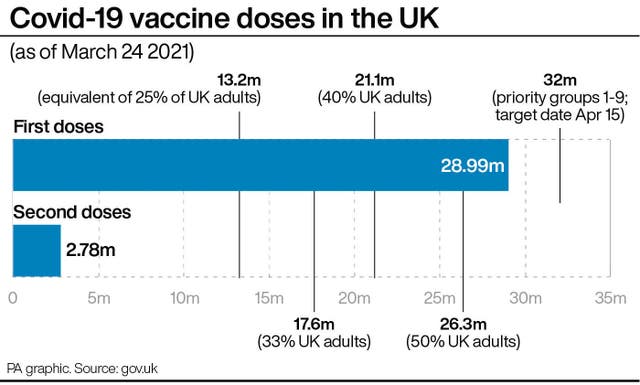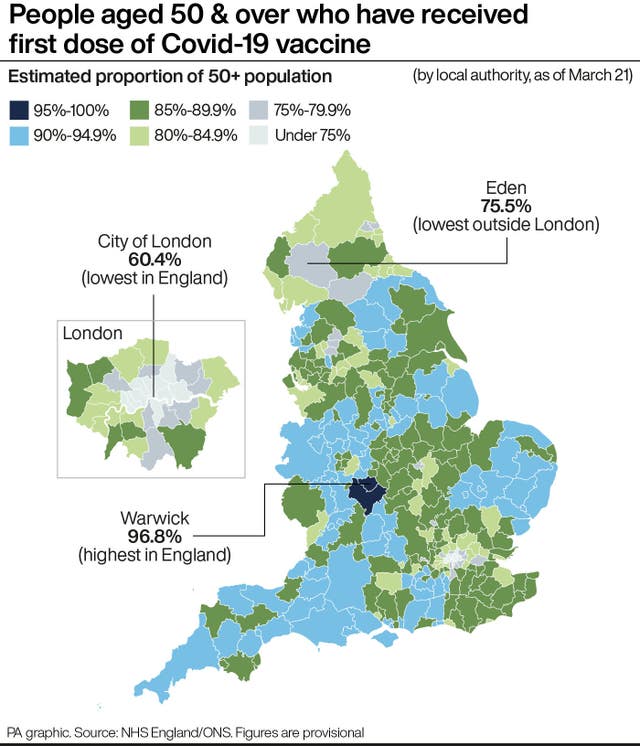Single dose of Pfizer vaccine generates strong immune response, study shows
Researchers say the findings support the UK policy of rapid rollout of one dose to provide cover as quickly as possible for higher-risk groups.

The Pfizer/BioNTech vaccine generates a robust immune response in 99% of people after one dose, new research suggests.
One dose of the vaccine protects against severe disease and after two jabs, levels of protection are even stronger – underlining the importance of people coming forward for their second shot.
The findings support the UK policy of rapid rollout of one dose of vaccine to provide cover as quickly as possible for the higher-risk groups, researchers say.
The Protective Immunity from T cells to Covid-19 in Health workers study (Pitch) examined how the immune system responds to the virus after one dose of the Pfizer/BioNTech vaccine among people who have been previously infected, and those who have not.
Between December 9 last year and February 9, researchers from the universities of Sheffield, Oxford, Liverpool, Newcastle and Birmingham analysed blood samples from 237 health workers to understand their T cell and antibody responses following vaccination.
They found that after one dose of the Pfizer vaccine, individuals who had previous infection showed higher antibody and T cell responses compared with people who had not been infected before.
Antibody responses were 6.8 times higher and T cell responses were 5.9 times higher.
Among individuals who had not had the virus in the past and had received one dose of the jab, antibody and T cell responses were at a similar or higher level compared to those who had previously been infected but not been vaccinated.
As well as creating antibodies, the immune system produces T-cells in response to an infection.
T cells are a type of white blood cell which seek and destroy infected cells.
The study, which has not yet been peer-reviewed, found that among people who had been infected in the past, the T cell response expanded after vaccination to recognise more regions of the Covid-19 spike protein – which attacks the immune system and causes severe disease.
This suggests that even in those already infected, vaccination from the Pfizer jab provides better protection and an enhanced immune response to the virus than the immune response from natural infection.
Dr Thushan de Silva, study author from the University of Sheffield, said: “Our results demonstrate that T cell and antibody responses induced by natural infection are boosted significantly by a single dose of vaccine.

“While the response to a single dose was lower in infection-naive individuals, it was still equivalent or better than the immunity in previously infected individuals before it is boosted by vaccination.”
He told a press briefing: “In general, the stronger your antibody response, the more likely it is that you will have protection against the events of concern.
“So the key is getting a really, really strong response and getting that second dose is going to help you with that, that response.”
However, it is not yet known how long T cell and antibody response lasts.
The first dose of both the Pfizer and Oxford/AstraZeneca vaccine offer good levels of protection, but to get maximum protection scientists say a second dose is vital and will provide a lasting defence.
Researchers found no link between age and levels of T cell/antibody response.
The study also indicates that boosting pre-existing antibody responses with current vaccines could provide protections against variants of the virus.
People who have had prior infection and get one vaccine dose have much stronger neutralising ability, allowing them to maintain neutralising activity against the variants of concern, researchers say.

They add that although they saw no neutralising activity against the South African variant in people without previous infection after one dose, this does not mean there is no protection as other immune responses like T cells are unaffected by these mutations.
Dr de Silva added: “I have lots of individuals, healthcare workers, writing and asking – they’d had Covid before, ‘do they really need a vaccine?’ and my answer is, actually with vaccination, you can get higher antibody responses than currently you have from your infection nine months ago.”
Health Secretary Matt Hancock said: “The vaccine has already saved thousands of lives in the UK.
“A second vaccine jab is crucial for longer-term protection, regardless of whether you have previously had Covid-19 or not, and I urge everyone to make sure they attend their second appointment to keep themselves and those around them safe.”
The study, led by Sheffield and Oxford universities with support from the UK Coronavirus Immunology Consortium, was funded by the Department of Health and Social Care.





